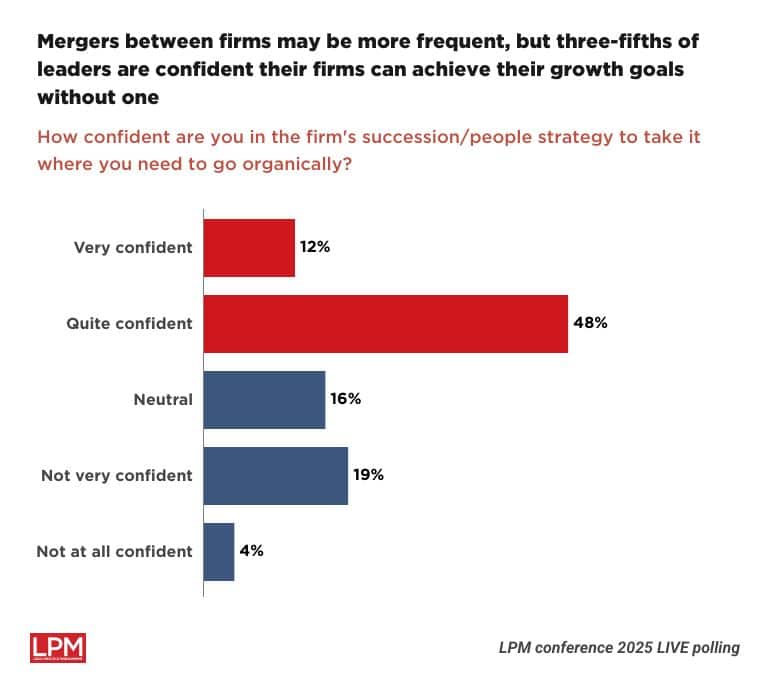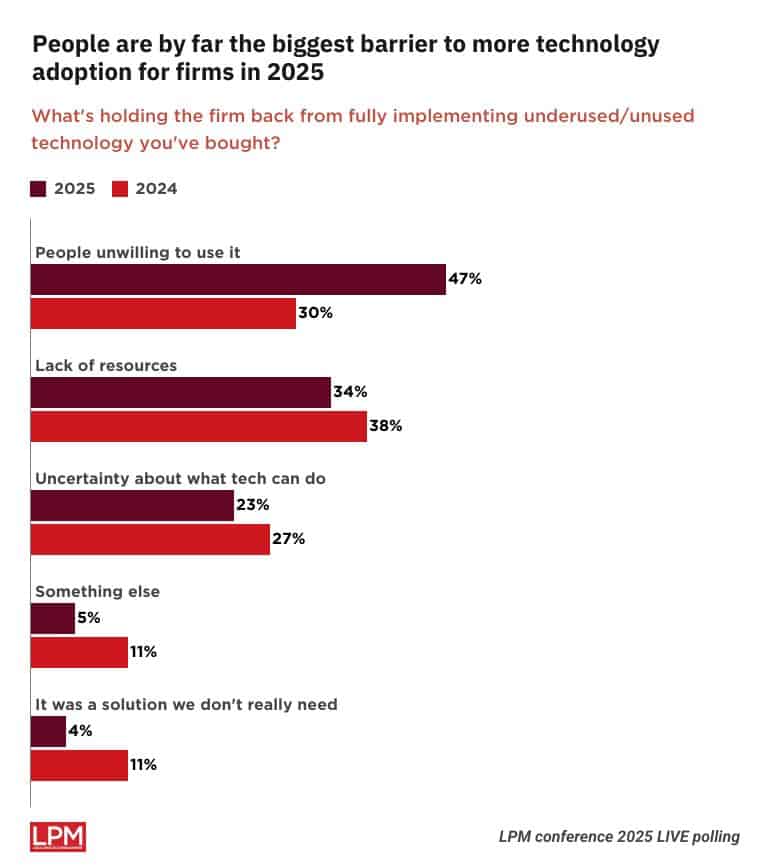Contents
Insights from the 2025 LPM Conference Polls: Tackling compliance, culture, and change in SME law firms
The future of SME law firms continues to hold opportunity, as reflected in the 2025 LPM conference polls. While compliance demands, cultural barriers to technology, and the challenge of attracting and retaining talent remain front of mind, many leaders are confident in their firm’s ability to grow, adapt, and thrive.
Osprey Approach was proud to contribute to this year’s LPM report and support the conference, where leaders from more than 70 firms came together to share honest reflections on the sector. Across the sessions, discussions centred on talent strategies, efficiency improvements, leadership in a hybrid world, and the impact of emerging technologies such as AI.
Here, we explore the results of the law firm leader poll and consider how these trends might shape the SME legal landscape in 2025 and beyond.
Confidence in organic growth strategies
When asked how confident they were in their firm’s succession and people strategy, three-fifths of leaders said they were confident they could achieve their growth goals without needing to merge. Just under one in five admitted low confidence, while 16% were neutral.
This reflects what we heard in our leadership roundtable: many firms are backing their people and culture to drive performance, rather than relying on structural change. But leaders also recognised that success depends on more than headcount. Communication, consistency, and creating a positive culture were repeatedly highlighted as critical to sustaining growth.

Our conversations also showed that productivity is a priority where hiring isn’t an option. Firms told us they are focusing on making the most of the people they already have through clearer processes, smarter use of technology, and investment in team skills. For many, organic growth is possible — but only if inefficiencies are tackled and leadership is purposeful.
AI may reshape junior hiring in the years ahead
five years’ time, just over half of SME firm leaders said it could — with 14% saying definitely and 38% potentially. A quarter felt it probably wouldn’t, while a fifth were unsure.
The discussion across the conference reflected this cautious optimism. Leaders acknowledged AI’s growing role in automating routine tasks but were clear that technology is a complement, not a replacement, for developing future talent. The consensus was that junior lawyers will still be vital — but their roles may shift, with less time spent on administrative tasks and more on client-facing, analytical, and strategic work earlier in their careers.
For Osprey, this underlines why adopting flexible, future-proofed software matters now. Firms that integrate AI effectively can create capacity, enabling junior staff to focus on higher-value work, learn faster, and contribute more meaningfully — a win for both the business and its people.
Compliance is becoming harder to manage
Nearly two-fifths of leaders (39%) said regulatory compliance is now significantly harder to manage than last year, up from 32% in 2024. A further 28% said it was “a bit harder” which means two-thirds of SME law firms believe compliance is more burdensome in 2025.
This resonates with the discussions we had in our masterclass. Firms told us that inefficiencies around client onboarding and data duplication are not just slowing teams down but also increasing compliance risk. When the same data is re-keyed across systems, or responsibility for checks like AML is unclear, errors creep in. Firm leaders agreed that data governance and ownership are critical, yet often overlooked, foundations for compliance.

People remain the biggest barrier to technology change
When asked what stops firms from fully adopting the technology they’ve already bought, almost half of leaders (47%) said the biggest barrier is people being unwilling to use it. This is up significantly from 30% last year.

The poll confirms what many shared in our “inefficiency secrets” workshop: much of the friction in firms comes down to individual habits and behaviours, not just systems. From colleagues feeling pressured to respond instantly to every email, to old routines like printing and posting letters unnecessarily, change requires more than just tools – it requires cultural alignment.
Our conversations highlighted that firm-wide etiquette, clear processes, and leadership modelling of good behaviours are needed if firms are to shift working practices. Without that, even the best technology struggles to gain traction.
Building a successful modern law firm
The findings from the LPM conference poll show that SME law firms face increasing pressure from compliance demands, evolving technology, and ongoing talent challenges. But the conversations throughout the day highlighted that with the right leadership, mindset, and focus on efficiency, these challenges can be turned into opportunities.
Osprey is committed to supporting SME law firms in building sustainable, high-performing practices. By helping firms streamline processes, integrate smart technology, and nurture positive workplace cultures, we enable them to create environments where both people and businesses can thrive.
As firms look to the future, we are here to provide the tools and insight they need to stay resilient and competitive. Whether it’s improving workflows, embedding cultural change, or using technology to unlock capacity, Osprey works alongside law firms every step of the way — turning today’s challenges into tomorrow’s strengths.
For a deeper look into the trends shaping SME law firms, explore the full LPM conference report —a valuable resource for firms charting their future success.


